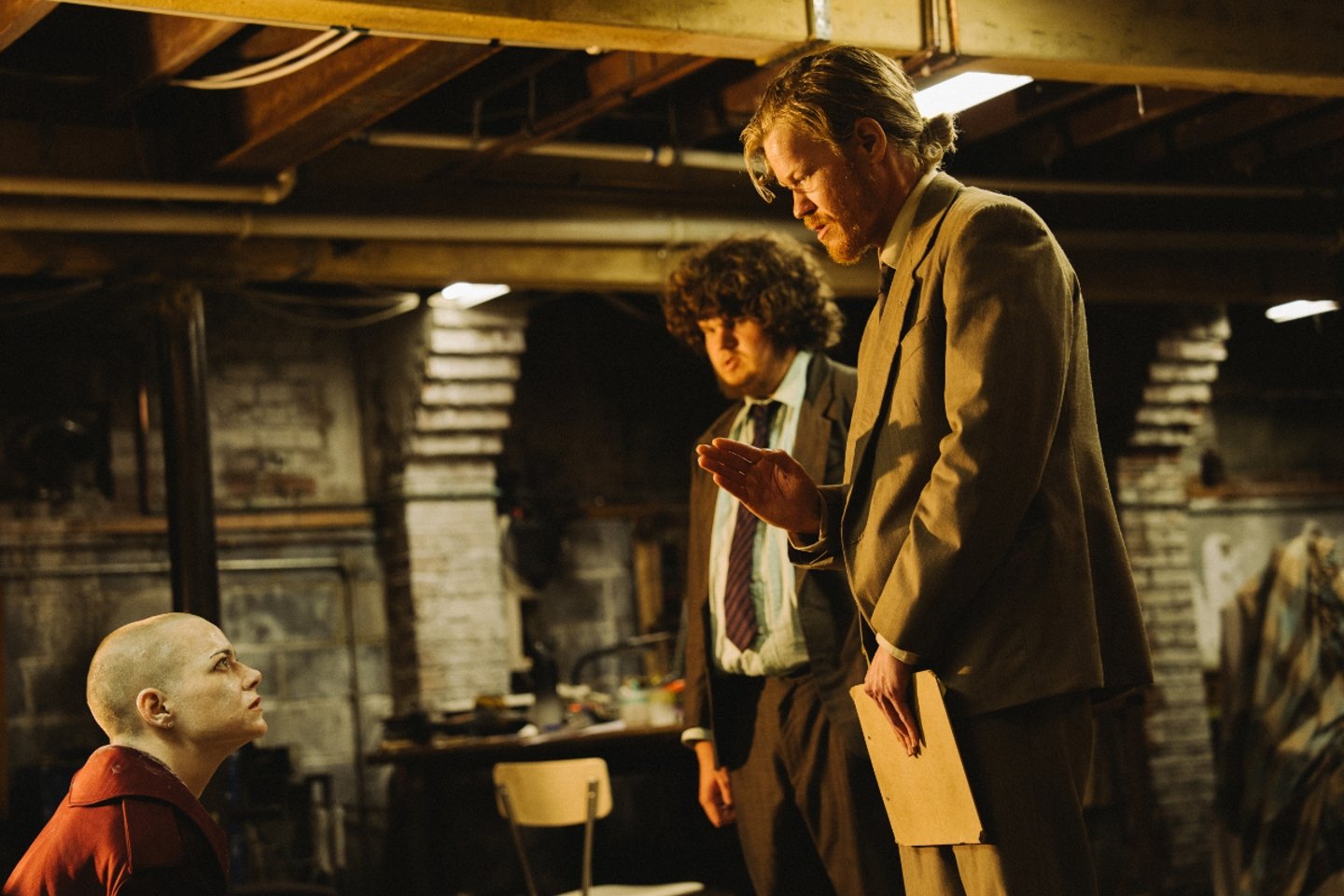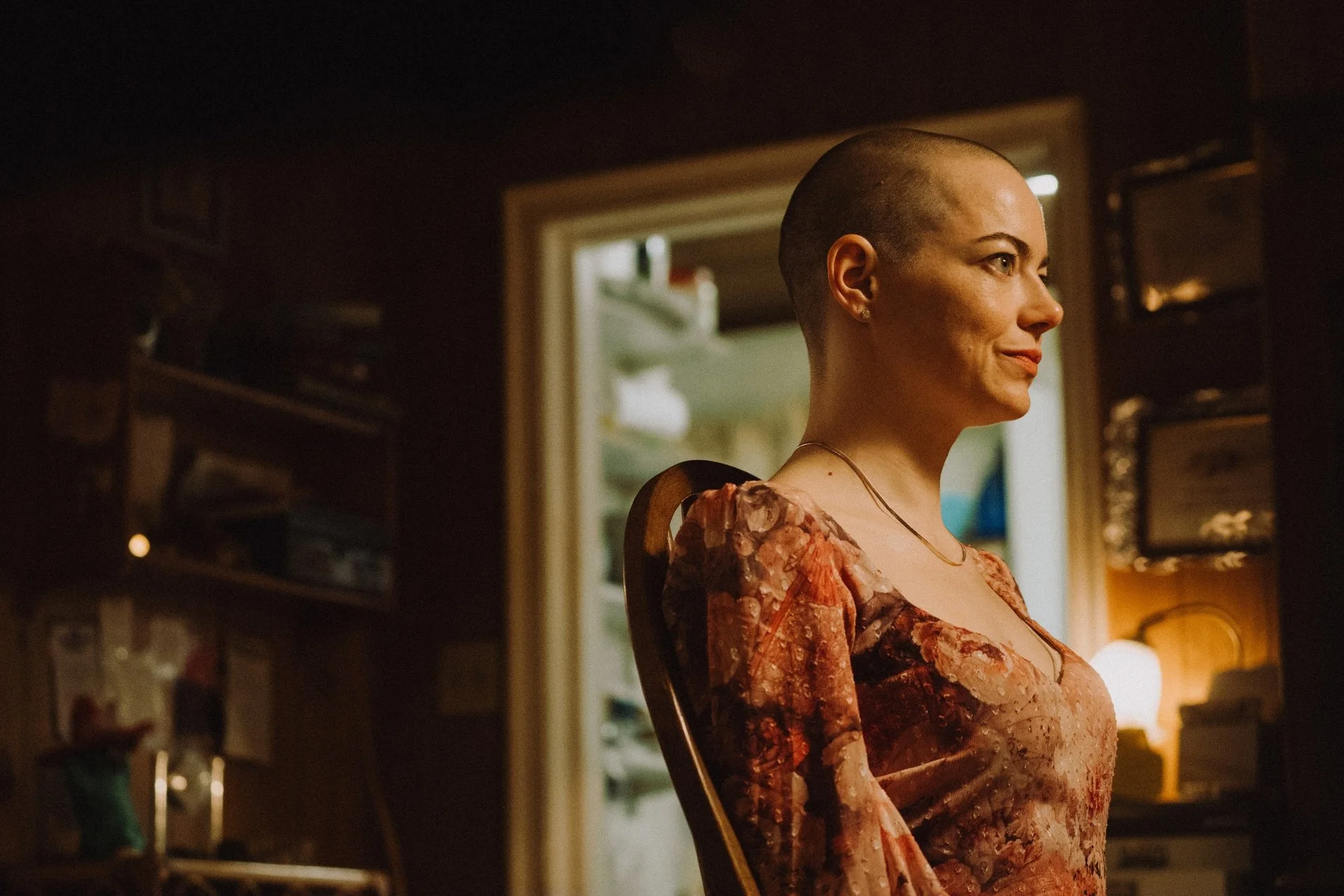‘Bugonia’ Review: Emma Stone and Jesse Plemons Battle Over Doomed Humanity in Yorgos Lanthimos’ Loopy Dark Comedy About Our Planet in Peril
Emma Stone in Bugonia - Credit: Focus Features
Emma Stone and Jesse Plemons electrify in Yorgos Lanthimos’ surreal, satirical remake about paranoia, power, and the absurdity of saving a world that might not want saving.
With Bugonia, Yorgos Lanthimos returns to the terrain where he thrives most — a meticulously controlled world where chaos hums just beneath the surface. It’s a film that looks like a fable, plays like a hostage thriller, and moves with the rhythm of a lunatic waltz between belief and delusion. Based on Jang Joon-hwan’s cult Korean sci-fi dark comedy Save the Green Planet!, Bugonia reimagines its source material through Lanthimos’ cracked mirror: a dystopian satire of environmental collapse and moral decay that feels at once eerily plausible and completely unhinged.
The story begins with Teddy (Jesse Plemons), a beekeeper and amateur doomsday prophet, convinced that humanity’s collapse mirrors the bees’ extinction. He spends his days perfecting conspiracy theories about “Andromedons” — alien overlords disguised as human CEOs — and convincing his impressionable cousin Don (Aidan Delbis) that salvation depends on fighting back. His proof, if one can call it that, comes in the form of Michelle (Emma Stone), a sleek pharmaceutical executive who becomes his unwitting hostage after a violent abduction staged under a pastel suburban sky.
L-r: Emma Stone, Aidan Delbis, and Jesse Plemons in Bugonia - Credit: Focus Features
Michelle, who speaks in the antiseptic cadences of corporate virtue-signaling, insists she’s merely an ambitious woman in charge of a global empire. Teddy insists she’s an extraterrestrial colonizer draining the planet of life. Between them lies a basement laboratory, a broken psyche, and the increasingly blurry boundary between reason and madness. As the lunar eclipse approaches — the moment Teddy believes humanity’s final purge will begin— Bugonia becomes a frantic dance of dominance, empathy, and mutual self-destruction.
Will Tracy’s screenplay (The Menu, Succession) gives the film a structure that’s part hostage thriller, part philosophical duel. The dialogue oscillates between the absurd and the profound, as when Teddy warns Don that “procreation is a pain trap” before chemically castrating himself in preparation for cosmic warfare. It’s grotesque, funny, and unsettlingly poetic — Lanthimos’ holy trinity. The script isn’t as narratively taut as The Favourite or as thematically expansive as Poor Things, but it revels in contradiction: the savior who might be insane, the villain who might be right, and the apocalypse that might already be over.
Emma Stone in Bugonia - Credit: Focus Features
Stone’s Michelle is a masterpiece of composure weaponized. Every line, every glare, feels sharpened to cut through Teddy’s delusion, but also her own moral vacuum. She’s terrifying in her precision — a performance of both survival and self-preservation. When she screams, “You can’t beat me because I’m a winner,” it lands like a thesis statement for late capitalism itself. Meanwhile, Plemons is extraordinary as the zealot whose self-righteous paranoia begins to look uncomfortably familiar. His ability to blend fragility with menace makes Teddy as pitiable as he is horrifying — the perfect Lanthimos protagonist.
The supporting performances deepen the absurdity. Delbis brings a naïve melancholy to Don, the disciple who begins to see his messiah unravel. Alicia Silverstone’s brief appearance as Teddy’s comatose mother — the victim of Michelle’s pharmaceutical empire — provides the story’s most literal intersection of guilt and grief. Even minor roles, like Stavros Halkias as a local cop and would-be savior, are sketched with tragicomic humanity.
Emma Stone in Bugonia - Credit: Focus Features
Cinematographer Robbie Ryan’s VistaVision photography transforms suburban banality into cosmic theater. His compositions are as symmetrical as Wes Anderson’s but far more diseased — framing the actors as specimens inside a sterile vivarium. The light is sickly, the color palette unnerving: electric oranges, industrial greens, blood reds. It’s as though the film itself were infected with whatever psychic illness grips its characters. Jerskin Fendrix’s score amplifies that tension with symphonic hysteria — a swirl of operatic strings and thudding percussion that occasionally collapses into silence so thick it’s suffocating.
Thematically, Bugonia is unmistakably Lanthimos: a study of control, cruelty, and the absurd lengths to which people go to impose order on the chaos of existence. Yet there’s also tenderness here, buried under the grotesque. When Teddy stares at the stars, muttering that “humans deserve extinction,” you sense a child’s ache for meaning in a world that’s lost its moral compass. Michelle, for her part, embodies the corporate machine that feeds on despair but refuses to acknowledge its own complicity. Together, they form an ecosystem of delusion — predators and prey locked in a feedback loop of exploitation.
Aidan Delbis and Jesse Plemons in Bugonia - Credit: Focus Features
The film’s third act shifts into pure Lanthimos delirium. Genre melts into allegory as torture scenes give way to surreal visions of rebirth, bees swarming through sterile corridors, and a finale that literalizes the title’s Greek roots: bugonia, the mythical rebirth of life from the decay of the dead. It’s both grotesque and weirdly hopeful — an apocalyptic nursery rhyme for a species that can’t stop destroying itself.
POPULAR ON THE CINEMA GROUP
What makes Bugonia work, even when it falters, is Lanthimos’ ability to find humor in despair. He stages violence with slapstick absurdity, grief with the rhythm of a deadpan joke. It’s a cinematic language uniquely his own: one where irony and sincerity coexist without ever canceling each other out. That tonal balancing act turns what could have been a hollow satire into something richer — a tragicomedy about the madness of trying to be good in a world allergic to goodness.
Emma Stone in Bugonia - Credit: Focus Features
At times, the film feels like a minor entry in Lanthimos’ canon — less ambitious than Poor Things, less revelatory than The Lobster. But within its narrower frame, it’s also one of his most accessible works: a parable about ecological collapse, corporate power, and the futility of human salvation that somehow manages to be funny, frightening, and deeply sad all at once. By the time Marlene Dietrich’s ghostly rendition of “Where Have All the Flowers Gone?” plays over the closing montage, Bugonia achieves something rare — an ending that’s both punchline and requiem.
Rating: ★★★★☆
That’s a Wrap
|
Bugonia [2025]
|
That’s a Wrap | Bugonia [2025] |
“Lanthimos’ Bugonia buzzes with manic energy and existential dread, carried by two fearless performances from Emma Stone and Jesse Plemons. It’s a cosmic farce about extinction and empathy — and proof that the director’s sting is still as sharp as ever.”
CREDITS
Airdate: October 31 | Focus Features
Cast: Emma Stone, Jesse Plemons, Aidan Delbis, Alicia Silverstone, Stavros Halkias
Director: Yorgos Lanthimos
Writers: Will Tracy (adaptation), based on Save the Green Planet! by Jang Joon Hwan
Out Now: In theaters
Rating: R
















![Sundance 2026 Recap [Part i]
Another Sundance in the books. Last one in Park City— premieres, portraits, and the people who made it.
More to come!
📸: @jonathanpmoustakas on @sonyalpha
#sundancefilmfestival #sundance2026 #thecinemagroup](https://images.squarespace-cdn.com/content/v1/65c1a54efb10480185732c60/1770112011067-GAUJ8WUARIG299C1YW9J/image-asset.jpeg)













